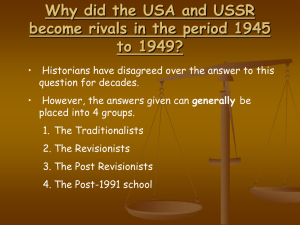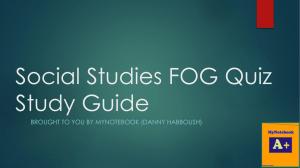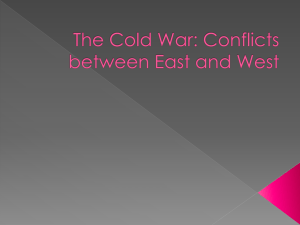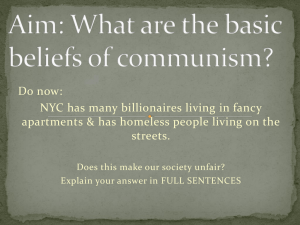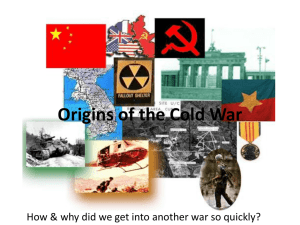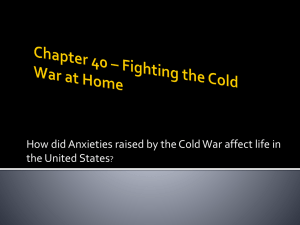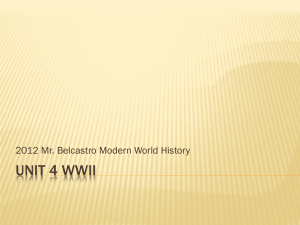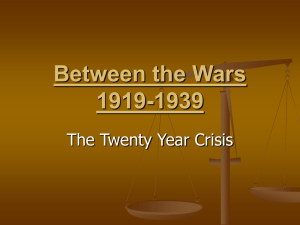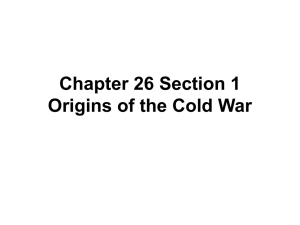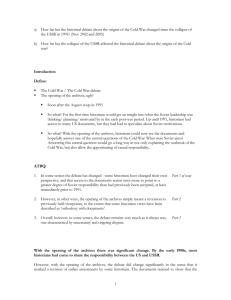Worksheet #5 Who`s To Blame?
advertisement
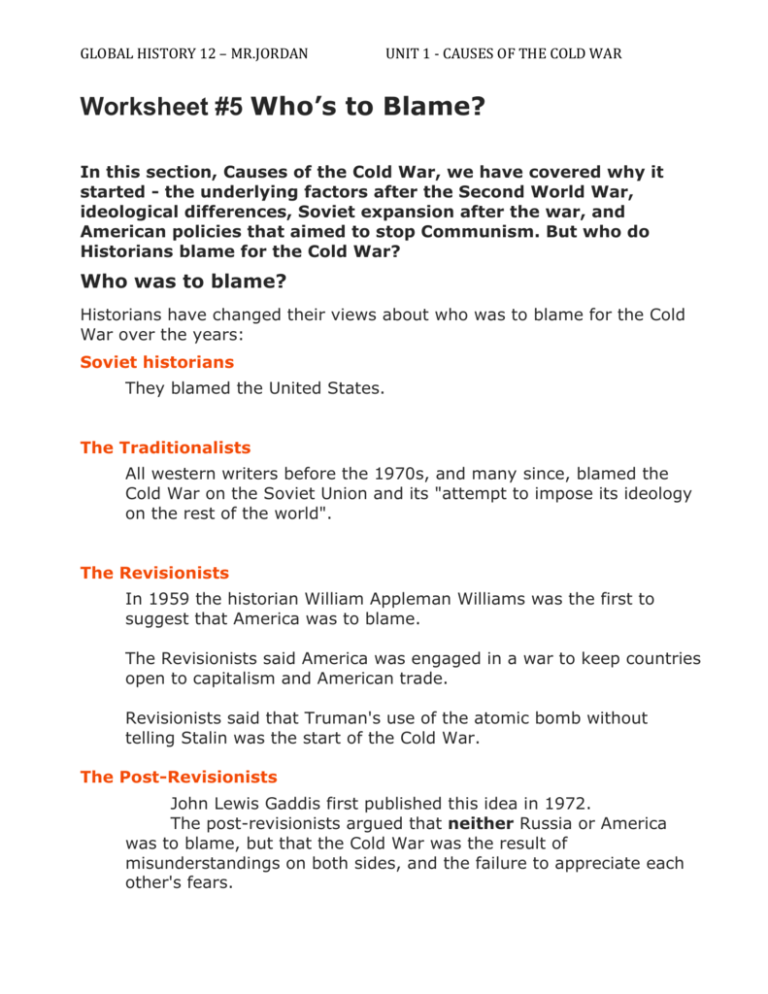
GLOBAL HISTORY 12 – MR.JORDAN UNIT 1 - CAUSES OF THE COLD WAR Worksheet #5 Who’s to Blame? In this section, Causes of the Cold War, we have covered why it started - the underlying factors after the Second World War, ideological differences, Soviet expansion after the war, and American policies that aimed to stop Communism. But who do Historians blame for the Cold War? Who was to blame? Historians have changed their views about who was to blame for the Cold War over the years: Soviet historians They blamed the United States. The Traditionalists All western writers before the 1970s, and many since, blamed the Cold War on the Soviet Union and its "attempt to impose its ideology on the rest of the world". The Revisionists In 1959 the historian William Appleman Williams was the first to suggest that America was to blame. The Revisionists said America was engaged in a war to keep countries open to capitalism and American trade. Revisionists said that Truman's use of the atomic bomb without telling Stalin was the start of the Cold War. The Post-Revisionists John Lewis Gaddis first published this idea in 1972. The post-revisionists argued that neither Russia or America was to blame, but that the Cold War was the result of misunderstandings on both sides, and the failure to appreciate each other's fears. GLOBAL HISTORY 12 – MR.JORDAN UNIT 1 - CAUSES OF THE COLD WAR After the collapse of Communism Russian historians such as Zubok and Pleshakov have been able to study the Soviet Union's secret files for the first time. These files show that Soviet leaders during the Cold War were genuinely trying to avoid conflict with the USA. This puts more of the blame back on America. Modern historians stress the Cold War as a clash between capitalism and communism. WORKSHEET #5 REVIEW QUESTION Which country was more to blame for the start of the Cold War: the USA or the USSR. Read the following article before you providing your response. GLOBAL HISTORY 12 – MR.JORDAN UNIT 1 - CAUSES OF THE COLD WAR Post-1991 In 1991, Communism in the Soviet Union collapsed. This has allowed historians to get to see the Russian archives, and to investigate what Russia was REALLY about in this period. In Inside the Kremlin's Cold War: from Stalin to Khrushchev (1997), the Russian historians Vladislav Zubok and Constantine Pleshakov, use de-classified Soviet documents to analyse Stalin’s part in causing the Cold War. They reveal a fanatic belief in Communism, lots of personal faults and mistakes, but – above all – a genuine desire to avoid confrontation with the USA . Many of these recent studies of early Cold War history are increasingly portraying the Cold War as a CLASH OF IDEOLOGIES – as a clash between Capitalism and Communism: The Cold War was caused by cultural differences between capitalist society and communist society. Distance learning Company tutor’s comments on a students’ essay on 'Nation States and Transnational Corporations'. Despite the divergence of opinion concerning the origin and nature of the Cold War, there is an increasing consensus that shapes Cold War historiography. While scholars may have been blinded by loyalty and guilt in examining the evidence regarding the origins of the Cold War in the past, increasingly, scholars with greater access to archival evidence on all sides have come to the conclusion that the conflicting and unyielding ideological ambitions were the source of the complicated and historic tale that was the Cold War. Timothy White, Cold War Historiography: New Evidence Behind Traditional Typographies (2000) This is a difficult but very informative overview on the web of the historiography of the Cold War. Timothy White is on the faculty of Xavier University, Cincinnati, USA. and read also the following interpretation, which defines other 'schools of thought' about the causes of the Cold War: The 'realist' interpretation views the Cold War as a great power conflict between the two geopolitically dominant powers which emerged from the GLOBAL HISTORY 12 – MR.JORDAN UNIT 1 - CAUSES OF THE COLD WAR Second World War. Wolhforth captures this approach: ‘the Cold War was caused by the rise of Soviet power and the fear this caused in the West’. Similarly, the 'liberal' interpretation sees the Cold War as a military conflict, which, rather than being the result of power vacuums, was the product of poor policy decisions, misperceptions and missed opportunities; given this, many argue, the Cold War could have been avoided. For 'radicals', the Cold War was not really a conflict of values, ideas or interests, but a military conflict coloured with the patina of ideological rhetoric that was used by both sides to establish and further the domination of their own spheres of influence. The liberal, realist and radical approaches are not satisfactory… In short, seeing the Cold War as an acute phase of the conflict between capitalism and Soviet communism avoids the determinism of the radicals and the simplification of the realists and liberals. From an academic publication on International Relations (author not known). The four statements following typify the four different interpretations of the causes of the Cold War - the 'Traditional', 'Revisionist', 'Post-revisionist' and 'Post-1991 (ideological)' interpretations. Quote 1 Who said that capitalism is meek and mild? Capitalism is BY NATURE aggressive. Businessmen WANT to dominate the world market, and think it is good to want to do so. After 1946 American businessmen had the American government enthusiastically behind them. And together they set about systematically destroying ‘the opposition’ – which, in global terms, meant the Soviet Union . It was American capitalism that caused the Cold War, and it had the additional advantage that the Communists (since they used political means to assert themselves) could so easily be made to look oppressive and GLOBAL HISTORY 12 – MR.JORDAN UNIT 1 - CAUSES OF THE COLD WAR tyrannical. They didn’t stand a chance. Quote 2 It seems almost irreverent to say so – given the millions of people who died because of it – but the whole Cold War thing was no more than a lack of communication. Both sides decided at Potsdam that the other was impossible, and they just stopped talking to each other. As soon as Kennedy installed the hotline, the Cold War ceased to be a threat to humanity. And the Cold War didn’t end with the collapse of Communism in 1991; it ended long before that, when Gorbachev and Reagan started being honest with each other. Quote 3 The Cold War was a fight to the death between two ways of life, one which advocated free trade and democracy, and the other which believed in a command [government-controlled] economy and political unity. What made the war so vicious was that both sides – government and peoples – believed, not only that their way was better, but that it was absolutely essential to the future happiness of humanity. Quote 4 Stalin wanted Russia to rule the world and – like the Terminator – there was no way he was ever going to stop unless someone stopped him. It wasn’t just America – the whole free Western world was aware of the threat. And what would life have been like in a world dominated by Stalin? The Communists murdered and imprisoned their own people by the million. They oppressed Muslims and Christians alike. They sent in the tanks to any Iron Curtain country which looked like it wanted to be free. Reagan called the Soviet Union ‘the evil empire'; and he was right. Stalin caused the Cold War; the West was just defending itself.
